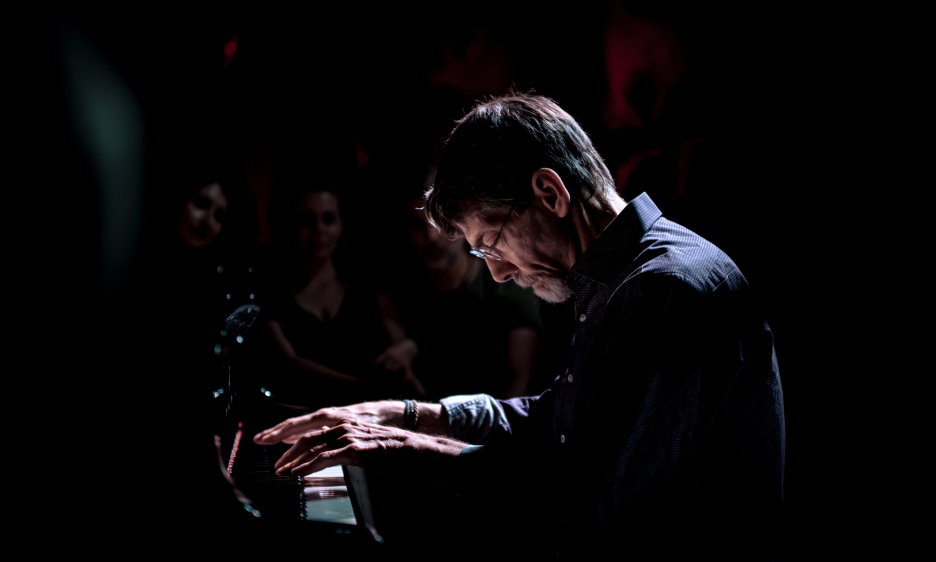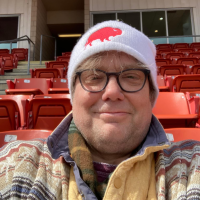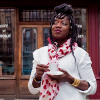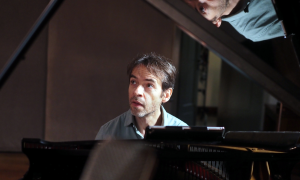Home » Jazz Articles » Interview » Fred Hersch: A Lifetime Of Meditation At The Piano
Fred Hersch: A Lifetime Of Meditation At The Piano

Courtesy Roberto Cifarelli
The main thing I learned when I started sitting formally on a cushion is that I've been meditating my entire life, but on a piano bench.
—Fred Hersch
In his candid memoir, Good Things Happen Slowly: A Life In And Out Of Jazz (Crown Archetype Press, 2017), Hersch described how he creates music. He wrote:
I sit down, settle onto the piano stool, and see what kind of mood I'm in. Sometimes when playing with my trio I will ask them what they feel like starting with—a nice surprise for me, as I tend to play better if I don't overthink things. If I'm playing with the group, I get a thousand cues from the bassist and the drummer, and I send my own cues back to them. The music is like a rhythmic and harmonic river rushing along, and each of us jumps into it in our own way as it flows by.
Hersch has created a remarkable body of recorded work. After recording over sixty albums as a leader/co-leader for various labels, the pianist signed for ECM Records with whom he has has released three albums since 2022: a duo with trumpeter Enrico Rava (The Song Is You ), a solo recording (Silent, Listening), and a trio outing, (The Surrounding Green).
We met online on July 4, 2025 as he was preparing for a tour of Europe and Asia. This interview has been edited for length and clarity.
All About Jazz: My first question relates to your body of work. Do you consider yourself a composer first, a musician, or both?
Fred Hersch: I consider myself a pianist first. That's how I've expressed myself since I was four years old. I started as an improviser. I mean, I was lucky to find jazz. It was a great way to improvise with people, it was super fun and I loved the culture and I loved everything about it. I don't think it's any less creative to interpret a tune that somebody else has written than it is to play something that's yours or what you call "original."
I think a lot of young musicians put a lot of emphasis on having all original compositions. That's great if they're good composers and it's not so great if they're not good composers. I've not written a lot of music in the last couple years. I've had some challenges and I just haven't really felt it. I know it'll come back.
But I have a pretty good catalog of things I've written, not just jazz pieces, but what we loosely call contemporary classical pieces and other kinds of things. Jazz musicians are spontaneous composers by definition.
On my previous record,(Silent, Listening) there are a number of what I call spontaneous compositions where I might have just given it a little scribble and then took it from there, just an idea or a mood or in some cases just completely improvised with nothing to go on. That's something I enjoy doing, not just playing in a regular tune structure. And, when I did the record before that where I met Manfred Eicher and started working with ECM, it was a duo record with trumpet maestro Enrico Rava and he said, "it doesn't matter what you play, it's how you play it." And I do believe that, it's what you bring to whatever you play.
When I write a jazz tune, I hope it will be inspiring, memorable, and something that leaves room for the player whether it's me or someone else, to be themselves—that is, not overwritten.
Many of the greatest jazz great tunes are very short and very concentrated and I tend to go with that approach a little bit more than something that's super extended. Thelonious Monk, Wayne Shorter, Kenny Wheeler, and Ornette Coleman come to mind.
AAJ: The vision that I have of people composing is sort of like Mozart, the music coming to him from above, the composer as conduit. Is that how you hear music or is it something that you visualize on the piano?
FH: When I'm composing some music arrives out of thin air. I feel like, "thank you very much!" The title of the new album The Surrounding Green was like that. I had the title for about nine months before I had a tune. I wrote down that phrase and kept it on a stickie on my computer. I don't know where I heard it, but the tune eventually showed up fully formed.
It really varies. Each tune kind of comes in a different way. Sometimes I write tunes with a kitchen timer. I set it to 45 minutes and I make myself an assignment or pick a key or a rhythm or something and try to finish something very quickly. It's like speed writing. Some of my favorite tunes have come in that way.
AAJ: Can you give me an example of a speed writing tune that you did?
FH: "Anticipation," the last track on The Surrounding Green. Also "Dream of Monk," "Stuttering," and probably one of my most famous tunes "Endless Stars," and "Valentine."
AAJ:: Do you seek to develop a body of trio work?
FH: I'm not sure of the count, but I think I have something like 13 solo albums and 13 trio albums and then probably 20 duo albums by now. I had that long-running trio with John Hébert and Eric McPherson. We had a ten year run until the COVID lockdown. For a while the trio was more of the hub of my wheel.
Since I've been recording for ECM, solo has been more the hub, but every year I get to play three weeks at the Village Vanguard with the trio. I have been rotating rhythm sections, playing with a whole range of bass players and drummers, mixing and matching, and I'm really enjoying that quite a bit.
This summer I'm going to Europe. Next week is three trio concerts, one duo with Enrico Rava, and one solo concert. In the fall, I will be performing mostly solo concerts and a few trios. I think with The Surrounding Green maybe there'll be a little more trio performance. I like them both.
It's very inspiring when I'm playing with collaborators who are alert, experienced, have great sounds, and understand the tradition but are also able to break the rules.
When I'm playing solo I'm using all 88 notes. It's a drum set with 88 pitches. When I am playing in a trio I don't go down there so often. It's more of the middle and the upper register of the piano, roughly baritone to soprano coloratura, but within that I feel very free. It's hard to pick a favorite child. I can't pick one.
I also love playing duos with great musicians. I guess I could just say that my favorite is whatever I happen to be doing at the moment.
AAJ:: The way that you just described your touring—sometimes solo, sometimes trio—is that how you prefer it or is that just a function of how the shows are booked?
FH: It's a function of how the shows are booked. When I'm in the United States when I go out, it's like I'm going to do a trio for a week or I'm going to do a string of solo concerts. I don't usually mix and match, but sometimes for Europe I will mix and match. It depends what promoters want.
Obviously, playing solo piano outdoors is not that much fun, but I do it sometimes because that's what concerts are in the summer. I prefer to play in halls, and I'm lucky I get to play in the really good ones for the most part.
And I'm a little fussy about the piano. I want to have the right tool for the job, I want to have a piano that's going to inspire me.
AAJ: How is touring in Europe a different experience than the United States?
FH: Well, there's jet lag (laughs). In Europe the quality of pianos is better and I don't play as many clubs. It's more concerts and festivals. Here in the U.S., it's more of a combination of performing arts centers or universities and maybe a fill-in with a club now and then. I think there's an appreciation of music in Europe that is a little different, especially if I'm playing solo piano in a beautiful hall.
It's really a piano recital where I make up the program. I can play whatever I want. I'm not committed to playing a particular program a year and a half in advance. That drives some of my classical colleagues crazy, because maybe after a year and a half goes by they're really not interested in playing those particular pieces.
I get to form the concert as it unfolds. That's a great luxury. Once again, I like them both. I mean, there's no better gig in the world to me than playing at the Village Vanguard. That's the best place to play with the trio in the world. The piano, the sound, the vibe, the history. Doing 12 shows in New York is the whole ball of wax. I can walk to work. It's great!
But Europe is great, too. And I think now that I'm with ECM, I think my European profile will be getting bigger. I think they're getting behind this album a lot. They got behind the last one. ECM has a certain caché in Europe, similar to Blue Note Records here in the States.
AAJ: I want to ask you about Silent, Listening. Personally, I hear the influence of Paul Bley. Can you tell me about what inspired it?
FH:: When I met Manfred in the course of doing the duo album with Enrico Rava he said, "maybe we should work together." And then I kind of held him to it and I wrote to him and I said, "I want to make a solo album in the same place in this beautiful hall in Lugano at the Swiss Radio (Auditorio Stelio Molo RSI, Lugano). I want to use this piano. I want to make a solo album and I want you to produce it."
Manfred was very responsive to some spontaneous compositions that Enrico and I did. So, I knew that that would be a feature of the album. I fully intended to just have these short pieces. I've recorded "Star Crossed Lovers" (Passion Flower-The Music Of Billy Strayhorn) Nonesuch, 1996) and "Softly As In A Morning Sunrise" (Alive at the Vanguard) before.
I had a kind of a list of tunes, but those were ones that I just happened to play because I was just hearing them in the moment and we liked the performance and there's no harm in recording something more than once. Think of how many times Miles (Davis) recorded "Green Dolphin Street" or "Autumn Leaves." It's the performance that counts.
Paul is a definite influence for sure. I cite him as an influence and of course he was somebody who had a long history with the ECM label as well. He's definitely a strong influence along with so many others.
I associate him with his early work, those bootleg recordings with Ornette Coleman. The way that he was playing then and so many of his albums sound so fresh to me still. They're really classics, I think. And yeah, he's somebody that definitely is in the soup, among others.
AAJ: Do you ever do open improvisation, à la Keith Jarrett?
FH: I did it on Silent, Listening and an album called Open Book where there's a 20-minute open improvisation ("Through The Forest") but I don't do full improvised concerts. I don't know, maybe I'll get tired of playing tunes and want to do that.
There's usually some open music during the course of a concert but sometimes it just takes the form of an introduction or sometimes it's its own piece. It really just depends on my mood and how I'm feeling that day.
AAJ: Let me ask you about The Surrounding Green. How did you decide on the tunes after you came up with the title?
FH:: I had a list. I think we started sequencing the album with nine tunes and then both Manfred and I decided that eliminating a couple of them made the album tell a better story. Something really positive about my association with ECM is that I'm making shorter albums.
This one (The Surrounding Green) is 43 minutes and the one with Enrico (The Song Is You) is 43 minutes and the solo (Silent, Listening) is 49 minutes. You split them in half then you get an LP, which is nice. You don't have to get rid of anything.
I think you have a fighting chance that somebody might actually listen to the whole thing instead of looking at 65 minutes and 10 tracks and thinking "this is too much."
I could have maybe given more solo space to Drew Gress (bass) or Joey Baron (drums) but I mean they're playing all the time and their contribution is obvious. I don't think either one of them cares about how much they solo or not. The way Joey just, in his brief way, sets up a couple of these songs is wonderful. Drew just has one or two solos, but he makes the most of them.
Live, of course, we would probably stretch out a little bit more, but we recorded the album live on the stage. I have determined that I'm not going to ever make another record of my own using headphones because I play in real life without headphones and I don't know why I should have to do that when I'm making something that is likely going to be around forever.
When I am using headphones I can get very judgmental about my playing. I get negative. I can never get the balance right. So, whatever I do is going to be on a stage in a space. Joey is a master with dynamics. I mean, there was no problem with us hearing each other on the stage at all. So I think that's kind of be going to be where I go.
That's not unlike Keith (Jarrett) who at a certain point said he just wanted to have live recordings. I'm not comparing myself to him in any way but I can see it. He didn't write music or go in to a studio after a certain point.
I get that, but I'm not sure that I'm going to do the fully improvised concert thing.
AAJ: What is it about playing without headphones that you prefer?
FH: It's the difference between stage acting and film acting. When you're in the studio with headphones and you go down the rabbit hole trying to fix things or edit things or as opposed to saying, "this is a performance. Here it is."
I have a number of albums in my catalog that were never intended to be records but they just happened to get recorded and the performances were great and the sound was either great or good enough and they got released. I think those are my strongest albums, those that are live and kind of unintentional or set up in a way to be more performance-oriented.
The last studio album I did was the string quartet album (Fred Hersch: Breath By Breath) Palmetto, 2022) and I'm not that happy with my playing on it. I'm really not. I mean, it's okay but I never got in "the zone." I was also juggling the string quartet and the arrangements and the compositions. It's nice but not near the level of freedom that I play when I'm playing out in real life.
AAJ: I was listening to it just before I got on this call and I enjoyed it very much. I love string quartets and I found the jazz trio combination very interesting. How did that come to pass? Did you just hear the sound in your head?
FH: I mean, I've been a string quartet lover since I was five years old, especially the LaSalle Quartet. I studied in Cincinnati with the wife of one of the members of the LaSalle Quartet (Jeanne Rosenblum Kirstein, wife of Jack Kirstein, LaSalle Quartet cellist from 1955-1975), who were very famous at that time. I used to lie on the rug and listen their rehearsals.
I studied composition from third grade on and I did a lot of four-part writing, counterpoint, what not. I just love them and I felt that at that time I wanted to do an album that was more compositionally driven.
The main thing I learned when I started sitting formally on a cushion is that I've been meditating my entire life, but on a piano bench.
This idea came from my meditation practice during lockdown as an inspiration for music and it kind of saved my bacon. I go on silent retreats periodically for up to three or four weeks. It's something that's part of my life.
I discovered meditation in 1998 or 1999. I had done Transcendental Meditation back in the early '70s but never stuck with it. Then I discovered mindfulness meditation from John Kabat-Zinn and his book Wherever You Go There You Are (Balance, 1994).
Back then you could order guided meditation cassettes and I ordered them. I started a little sitting practice and a friend said, "hey I'm going up to Insight Meditation Society in Barre, Massachusetts for a retreat with my teacher, why don't you come with me?" And I said, "Sure!" I didn't know what I was in for.
Of course, I was struggling with my posture and pain and monkey mind and all kinds of things, positive and negative, that you go through when you do a first retreat. But something about it just said, "this is a good thing."
During periods of ill health, I've not been able to sit. Lately, the last month or two, I seem to have fallen off of my practice for some reason, but I know that it's there and I will return to it. I did a silent retreat in April for three weeks and that was a very good kind of timeout for me.
And instead of the breath or your butt on the seat, the anchor is the sound and the rhythm. My touch, the way that I make sound, and the flow of the music is my anchor and I think certainly formal meditation can be very good for your concentration. I feel good, like I'm checking in with myself.
Once I get off this tour, the next couple weeks, instead of doom-scrolling I'm going to sit. It's a lot of Europe in the fall, two times with the Village Vanguard, and a 70th birthday squeezed in there in the fall.
AAJ: Happy Birthday!
FH: Thank you. I mean, I was talking with a friend of mine in Switzerland today and both of us have been HIV positive for 40 years. Both of us came out when we were 18 or 19, although he is not publicly out about his HIV status. I've been very open about that. It's miraculous that we're here.
I mean, a lot of our friends died and people don't talk about it very much anymore. If you're in a developed country and you have access to health care, you can take a pill regimen of some sort or another and keep it at bay pretty much indefinitely.
I don't get up every morning and say, "praise the lord!" but I'm on balance very happy that I'm here and I have energy and I have this beautiful situation with ECM. I'm touring and trying to spread some joy.
I mean, that's really all I can do right now, try to make people forget for 75 minutes or 90 minutes all the shit that's going on. If I can do that then I feel like I have value. Absolutely.
AAJ: I see that you will be touring Asia. What's it like for an American jazz player in Asia? I know that Asia has a long history of American jazz.
FH: Japan and Germany are the two biggest jazz markets, the two people who lost the war. In Japan I'm more likely to be asked "who is the number one jazz pianist?"
It's hard. It seems to be hierarchical. Of course there is no "number one." I mean it's apples and oranges and raspberries. I mean it just depends on what you like. Japanese audiences are very attentive, usually subdued, not super effusive.
I'm going to Seoul and I've been there many times. For some reason I have a very young audience, a lot of young women, surprisingly. I'll be going to Taipei for the first time.
I don't know how that's going to work out, but in both cases I'm playing in very good conditions. It's 15 hours each way. I don't know how many times I'm going to do this again. It's a lot. The jet lag coming back is the worst ever. You're completely upside down, but the audiences are very respectful.
I'll tell you the difference. So, in Japan, after the show, people will line up and buy a CD or an LP and they'll ask for your signature. Of course, they want a photo, but once I start with one person, they're all going to want photos. So, no photos.
In Korea, they might buy a CD, but they also might ask you to sign their computer, or their bag, or their manuscript book, or their arm, or their phone. In China, they don't buy anything.
In Japan, it's like an honor thing. They're going to buy something that's honorable to do and then you can sign it. Korea is more 50/50 and China is not at all.
AAJ: What is your next project?
FH: I'm not sure what the next album project will be, but we'll see. I mean, a lot of it depends on what Manfred Eicher and I come up with. I feel very much at home at ECM right now and I think the feeling is mutual.
When I bought my first Keith Jarrett album in 1973, Solo Concerts: Bremen / Lausanne I never would have thought that 50 years later or more, I'd be doing albums with ECM. So, it was a sort of—I hate the term "bucket list"—but it was something that I thought that I would like to do before I stopped.
AAJ: Congratulations and thank you for your time. I wish you safe travels.
FH: You're welcome. It was my pleasure.
Tags
PREVIOUS / NEXT
Fred Hersch Concerts
Support All About Jazz
 All About Jazz has been a pillar of jazz since 1995, championing it as an art form and, more importantly, supporting the musicians who make it. Our enduring commitment has made "AAJ" one of the most culturally important websites of its kind, read by hundreds of thousands of fans, musicians and industry figures every month.
All About Jazz has been a pillar of jazz since 1995, championing it as an art form and, more importantly, supporting the musicians who make it. Our enduring commitment has made "AAJ" one of the most culturally important websites of its kind, read by hundreds of thousands of fans, musicians and industry figures every month.























